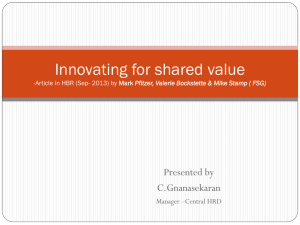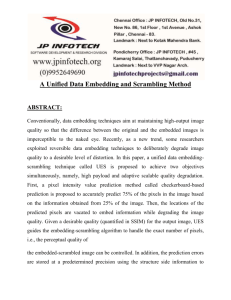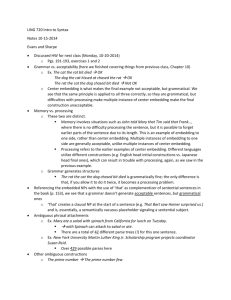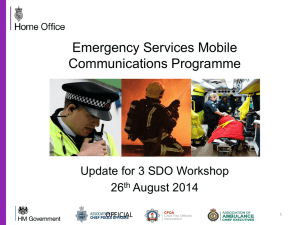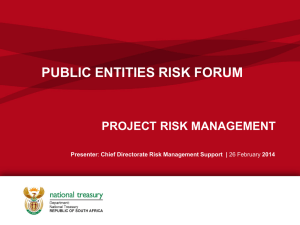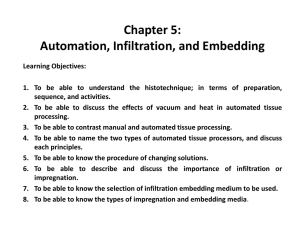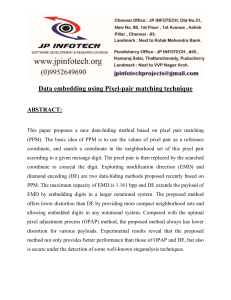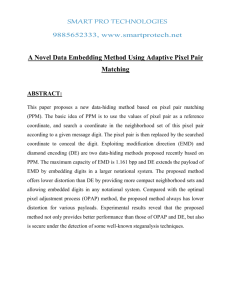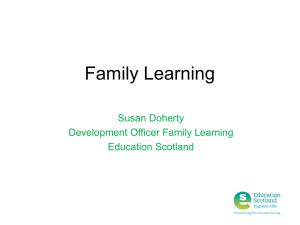What is public engagement?
advertisement
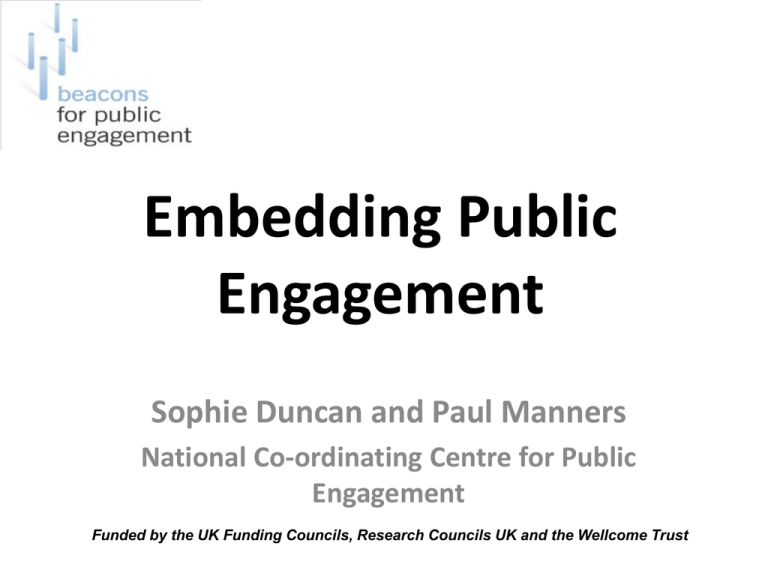
Embedding Public Engagement Sophie Duncan and Paul Manners National Co-ordinating Centre for Public Engagement Funded by the UK Funding Councils, Research Councils UK and the Wellcome Trust This initiative aims to create a culture within UK Higher Education where public engagement is formalised and embedded as a valued and recognised activity for staff at all levels, and for students. Funded by the UK Funding Councils, Research Councils UK and the Wellcome Trust What’s the problem? PUBLIC ENGAGEMENT UNIT Manchester Beacon connecting people, place & knowledge Manchester Beacon connecting people, place & knowledge Image: Michael Colvin The Beacons for Public Engagement are funded by the Higher Education Funding Council for England and Research Councils UK in association with the Wellcome Trust, the Higher Education Funding Council for Wales and the Scottish Funding Council. What is public engagement? Public engagement describes the myriad of ways in which the activity and benefits of higher education and research can be shared with the public. Engagement is by definition a two-way process, involving interaction and listening, with the goal of generating mutual benefit. Public engagement Defining the territory: universities and engagement The general public Communities of place & interest Schools and colleges Civic engagement Regional / national govt Local authorities Community organisations Potential stakeholders or partners Voluntary orgs and charities NGOs Regional strategic bodies Social enterprises Enterprise agencies Businesses Business engagement Community engagement INFORMING Inspiring, informing and educating the public, and making the work of HE more accessible CONSULTING Actively listening to the public’s views, concerns and insights COLLABORATING Working in partnership with the public to solve problems together, drawing on each other’s expertise PUBLIC ENGAGEMENT WITH RESEARCH Actively involving the public in the research activity of the institution • Collaborative research projects • Co-produced research with the public helping to shape the research design and/or delivery • Supporting the development of community-based researchers • Seeking insight or advice to inform future activity ENGAGED TEACHING Developing teaching activities which positively impact on the community, and enhance students’ engagement skills • Supporting lifelong learning and community capacity building • Teaching engagement skills • Raising aspirations of young people • Service (or ‘community-based’) learning The engaged university KNOWLEDGE EXCHANGE & SHARING SOCIAL RESPONSIBILITY Increasing the two-way flow of knowledge and insight between the university and wider society Seeking to maximise the benefits that the institution can generate for the public • Communicating research activity and outcomes • Contributing to regional and national policy development • Offering consultancy and CPD for community organisations • Investing in partnerships and infrastructure to support collaboration with civic society • Staff and student volunteering to support the community • Opening up facilities and campus to the public Discuss What are the similarities and differences between our approaches? Embedding public engagement The importance of public engagement “It’s difficult to say because it almost comes into a different category because it is not part of my job description or one of the measures against which I think I will ever be measured…it’s more like deciding do I want to go for a run today? It’s something I enjoy and it’s important but I don’t really see it as a part of my paid job” (Senior Researcher) CUE East baseline study Focal points for embedding public engagement PURPOSE Embedding a commitment to public engagement in institutional mission and strategy, and championing that commitment at all levels PEOPLE PROCESS Involving staff, students and representatives of the public and using their energy, expertise and feedback to shape the strategy and its delivery Investing in systems and processes that facilitate involvement, maximise impact and help to ensure quality and value for money PURPOSE Focal points for embedding public engagement Embedding a commitment to public engagement in institutional mission and strategy, and championing that commitment at all levels MISSION Create a shared understanding of the purpose, value, meaning and role of public engagement to staff and students and embed this in your strategy and mission. PEOPLE PROCESS Involving staff,Support students and Investing in who systems and public champions across the organisation embrace LEADERSHIP representatives of the public and processes that facilitate engagement using their energy, expertise and involvement, maximise impact feedback to shape the strategy and help to ensure quality and Communicate consistent, clear messages and its delivery value to forvalidate, money support and COMMUNICATION celebrate it, and ensure open and two-way communication with members of the public and community organisations. REWARD Recognise and reward staff involvement within recruitment, promotion, PURPOSE mbedding a commitment to workload plansEand public performance reviews, andengagement in institutional mission and celebrate success with and championing that strategy, awards or prizes. commitment at all levels Co-ordinate the delivery of public engagement to maximise efficiency, target SUPPORT support, improve quality, foster innovation, join up PEOPLE thinking and monitor Involving staff, students and involvement and impact. representatives of the public and Provide opportunities for using their energy, expertise and feedback to shape strategyand learning andthe reflection and its delivery LEARNING provide support for continuing professional development and training Focal points for embedding public engagement PROCESS Investing in systems and processes that facilitate involvement, maximise impact and help to ensure quality and value for money PURPOSE Focal points for embedding public engagement Embedding a commitment to public engagement inEnsure that all staff – in academic and institutional mission and support strategy, and championing that roles – have opportunities to STAFF get involved in informal and formal commitment at all levels ways. PEOPLE Involving staff, students and representatives of the public and using their energy, expertise and feedback to shape the strategy and its delivery Proactively include and involve students in shaping the mission and in the STUDENTS delivery of the strategy, and maximise PROCESS opportunities for their involvement. Investing in systems and processes that facilitate involvement, maximise impact and Invest in people, processes and help to ensureto quality andand nurture infrastructure support value for money PUBLIC the involvement of individuals and organisations external to the HEI Self assess Assess your own institution using the matrix THE CASE FOR PUBLIC ENGAGEMENT We believe that universities and research institutes have a major responsibility to contribute to society through their public engagement, and that they have much to gain in return. We are committed to sharing our knowledge, resources and skills with the public, and to listening to and learning from the expertise and insight of the different communities with which we engage. We are committed to developing our approach to managing, supporting and delivering public engagement for the benefit of staff, students and the public, and to sharing what we learn about effective practice. UK research organisations have a strategic commitment to public engagement Researchers are recognised and valued for their involvement with public engagement activities. Researchers are enabled to participate in public engagement activities through appropriate training, support and opportunities. The signatories and supporters of this Concordat will undertake regular reviews of their and the wider research sector’s progress in fostering public engagement across the UK.
